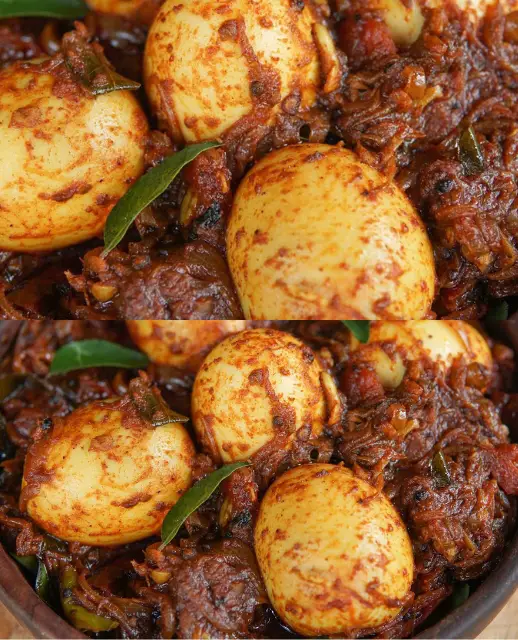Discover the rich tapestry of flavors with the Kerala Egg Roast, a staple dish from the coastal state of Kerala in India. This recipe brings a spicy and savory twist to your regular egg dishes, incorporating traditional spices like garam masala, red chili, and coriander powder. It’s a comforting meal that’s perfect for those who love a bit of heat in their food.
The process of making Kerala Egg Roast is as satisfying as the outcome. From the sizzling mustard seeds to the aromatic sauté of onions, ginger, garlic, and curry leaves, every step fills your kitchen with enticing aromas. The final addition of hard-boiled eggs, coated in the rich masala, makes this dish a hearty and fulfilling option for any meal. Whether you pair it with rice, chapati, or appam, the Kerala Egg Roast promises a burst of flavors with every bite.
Full Recipe:
Ingredients:
- 6 eggs, hard-boiled and peeled
- 3 to 4 onions, finely sliced
- 3 to 4 green chilies, slit
- 1 inch ginger, finely chopped
- 8 to 9 garlic cloves, finely chopped
- 2 to 3 sprigs curry leaves
- 1 tomato, chopped
- 1 tbsp coriander powder
- 1 1/2 tbsp red chili powder
- 1 tbsp garam masala
- 1 tbsp pepper seeds, crushed
- 1 tbsp mustard seeds
- 1 or 2 tsp salt, to taste
- 3 to 4 tbsp oil
Directions:
- Boil the Eggs: Hard boil the eggs, peel them, and set aside.
- Prepare the Masala: Heat oil in a pan. Add mustard seeds and let them splutter. Add the sliced onions, green chilies, ginger, garlic, and curry leaves. Sauté until the onions turn golden brown.
- Add Spices: Add the chopped tomatoes and cook until they turn mushy. Add coriander powder, red chili powder, garam masala, and salt. Mix well and cook for a couple of minutes.
- Add the Eggs: Make small slits in the boiled eggs and add them to the masala. Gently coat the eggs with the masala. Sprinkle crushed pepper seeds over the eggs.
- Simmer: Cover and cook on low heat for about 5 minutes, allowing the eggs to absorb the flavors.
- Serve: Serve the Kerala Egg Roast hot with rice, chapati, or appam.
Prep Time: 15 minutes | Cooking Time: 20 minutes | Total Time: 35 minutes
Kcal: 280 kcal per serving | Servings: 6 servings
Cultural Significance
Kerala Egg Roast, locally known as “Mutta Roast,” is deeply ingrained in the culinary traditions of Kerala, a state renowned for its spice trade history and vibrant cuisine. This dish reflects the multicultural influences that have shaped Kerala’s food culture, combining local ingredients with spices introduced by Arab, Portuguese, and British traders over centuries. Traditionally served during breakfast and special occasions, it symbolizes the communal and familial ethos of Keralite dining, where sharing a meal is a form of bonding.
Nutritional Benefits
Eggs are a powerhouse of nutrition, providing high-quality protein, vitamins D, B12, selenium, and choline, essential for various bodily functions. The spices used in Kerala Egg Roast, such as turmeric (found in garam masala) and red chili, offer anti-inflammatory and antioxidant benefits. Moreover, onions and garlic, key ingredients in the dish, are known for their cardiovascular and immune system benefits. This makes Kerala Egg Roast a balanced meal option that combines taste with health.
Variations
While the traditional Kerala Egg Roast is beloved across the state, there are several variations that cater to different taste preferences and dietary needs. Some cooks add coconut milk for a creamier texture, while others might increase the heat with extra chilies or use less for a milder version. A vegetarian alternative, known as “Paneer Roast,” substitutes eggs with paneer, offering a delightful option for vegetarians without compromising the essence of the original recipe.
Serving Suggestions
Kerala Egg Roast is versatile and pairs wonderfully with various staples of Indian cuisine. While it’s commonly served with rice, chapati, or appam, you can also enjoy it with Kerala parotta, a flaky flatbread, for a richer experience. For a lighter meal, pair it with dosa or idiyappam (string hoppers). To complement the spicy and savory notes of the dish, consider serving it with a side of cooling cucumber raita or a simple Kerala-style salad called “thoran.”
Anecdotes and Historical Notes
Sharing anecdotes or historical notes can bring the recipe to life. Mention how the Kerala Egg Roast, with its rich masala, reflects the state’s historical love affair with spices. You could include a story about how this dish is a Sunday morning staple in many Keralite households, often made to welcome unexpected guests, showcasing the region’s renowned hospitality. Highlighting its presence in traditional ‘sadya’ (feast) menus during festivals can also illustrate its cultural importance.
Mastering Flavor Balance
Offering tips on achieving the perfect flavor balance can be incredibly helpful to readers. Suggest ways to adjust the heat without compromising the dish’s integrity, such as using Kashmiri chili powder for a vibrant color but milder heat. Encourage readers to experiment with the amount of garam masala or to roast the spices beforehand to unlock their full aromatic potential. Reminding them to cook the onions until they are perfectly caramelized can also be a game-changer in enhancing the dish’s overall flavor profile.
Spices: The Heart of Kerala’s Culinary Legacy
A brief section on the role of spices in Kerala’s culinary history could captivate readers. Kerala, often referred to as the “Spice Garden of India,” has been at the forefront of the global spice trade for centuries. Each spice in the Kerala Egg Roast carries a piece of this history. For example, black pepper, native to Kerala, was considered more valuable than gold in ancient times and is a key ingredient in the dish. Discussing how these spices were historically used for both their flavors and medicinal properties can provide readers with a deeper appreciation for the recipe.
Cooking Techniques and Presentation
Detailing specific cooking techniques used in Kerala cuisine that apply to making Egg Roast can add depth to your article. Mention the traditional method of cooking in an earthen pot to enhance the flavors. For presentation, suggest garnishing with fried curry leaves or a sprinkle of fresh coriander to add color and aroma, transforming the dish into a feast for the eyes as well.
Frequently Asked Questions
Can I make Kerala Egg Roast without onions?
Onions are a foundational element in Kerala Egg Roast, contributing to its rich texture and sweet undertones. However, culinary creativity allows for adaptations. For those who cannot consume onions, shallots offer a similar sweetness and texture, albeit with a slightly more intense flavor. Shallots are often used in traditional Kerala dishes and can be a closer match to the intended taste profile. Alternatively, for a completely onion-free version, a blend of finely chopped celery with a small addition of sugar can mimic the texture and a hint of the sweetness that onions would typically provide. This combination won’t replicate the exact flavor of onions but will ensure the dish maintains its character through a similar savory-sweet balance.
Is it possible to prepare this dish ahead of time?
Kerala Egg Roast is remarkably flexible, allowing for preparation ahead of time, which can indeed enhance its flavors. Preparing the masala in advance and storing it allows the spices to meld together more cohesively, deepening the dish’s overall taste profile. When ready to serve, reheat the masala, making small incisions in the boiled eggs before adding them to the pan. This method ensures the eggs are perfectly coated with the spicy masala and are heated through without overcooking. This make-ahead approach not only saves time but can elevate the dish, making it even more flavorful and aromatic.
Can I use coconut oil for this recipe?
Using coconut oil in Kerala Egg Roast is highly recommended to achieve an authentic taste. Coconut oil is a staple in Kerala kitchens, appreciated for its unique flavor that complements the state’s spice-laden cuisine. Its slightly sweet and nutty aroma pairs wonderfully with the robust spices used in the egg roast, enhancing the dish’s overall flavor profile. If coconut oil is not available or preferred, vegetable oils can serve as a substitute. However, the distinctive taste coconut oil brings to the dish would be missed, slightly altering the traditional flavor.
How can I make this dish less spicy?
To reduce the spiciness of Kerala Egg Roast without losing its essence, consider adjusting the quantities of red chili powder and green chilies according to your heat tolerance. Using Kashmiri chili powder can offer a vibrant color with a milder heat compared to other varieties. Another strategy is to increase the amount of tomatoes, which adds acidity and sweetness, balancing the dish’s flavors and diluting the heat without compromising its rich taste. Remember, the key to a good Kerala Egg Roast is finding a balance that suits your palate while maintaining the harmony of spices.
What makes Kerala Egg Roast unique compared to other egg curries?
The distinctiveness of Kerala Egg Roast lies in its preparation and flavor profile. Unlike other egg curries, which might have a gravy or a more liquid sauce, Kerala Egg Roast features a thick, richly spiced coating around the eggs. The technique of roasting the spices along with the eggs imparts a depth of flavor and a caramelized texture that’s unique to this dish. Furthermore, specific spices like black pepper (indigenous to Kerala) and curry leaves add layers of flavor that are quintessentially Keralan. This dish exemplifies the state’s culinary heritage, where the blend of spices and the method of cooking bring out a complexity of flavors that’s hard to find in other egg dishes.
Conclusion
Kerala Egg Roast is not just a dish; it’s a celebration of flavors, history, and culture on a plate. A quintessential representation of Kerala’s rich culinary heritage, this dish tells a story of ancient spice routes, communal dining, and the warmth of a home-cooked meal. Whether you’re a spice aficionado or a lover of comforting, hearty meals, Kerala Egg Roast offers a window into the soul of Kerala’s kitchens. By mastering this recipe, you invite not only the aromas and tastes of South India into your home but also a piece of its history and communal spirit. So, the next time you sit down to savor this dish, remember, you’re experiencing centuries of culinary tradition, one bite at a time.


